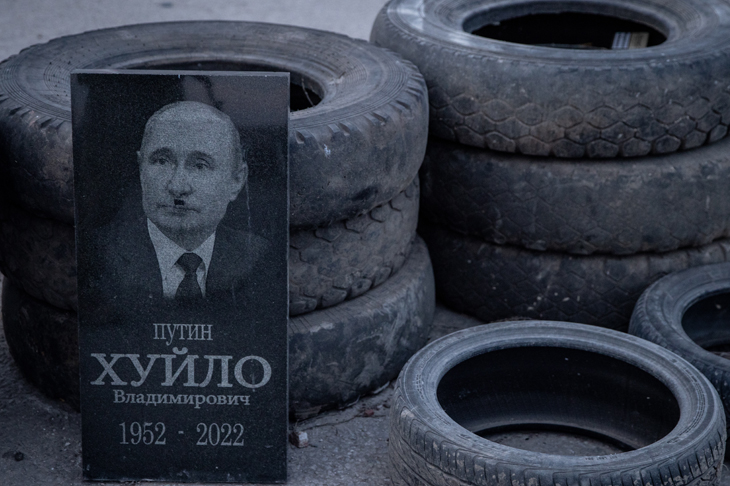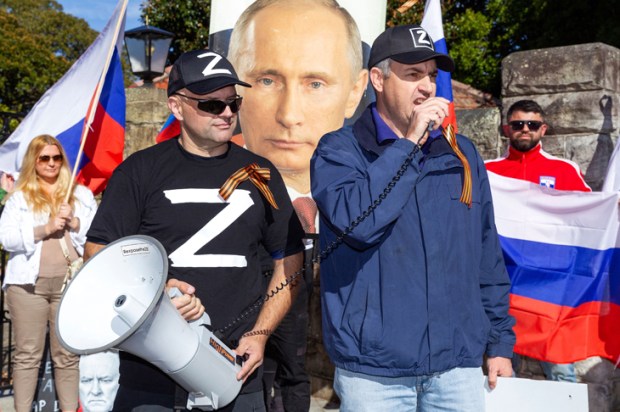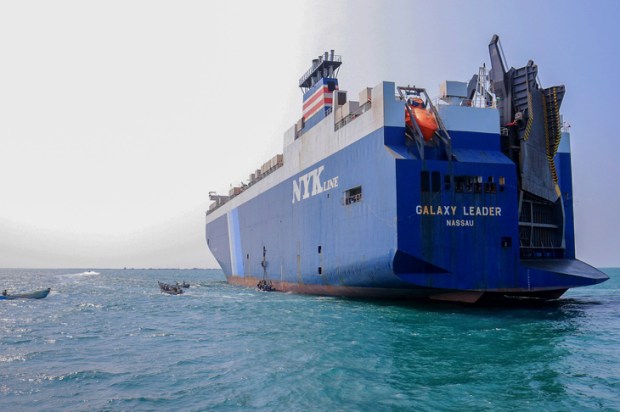In the ten months of horror since Putin’s assault on Ukraine, occasional particularly chilling cases of infamy stand out. One is that of Yurii Kerpatenko, director of Kherson’s Philharmonic Theatre, who was pressed by the Russian then-occupiers in September to participate in a ‘festive concert’ to celebrate the city’s new Russian future. He refused. Russian security officials turned up at his flat and shot him dead.
Just as Europe’s memories of the barbarism of Stalin’s Red Army fade from living memory, all its features have again been on display in Putin’s Ukrainian war: atrocities against those who refuse to collaborate; torture, rape, looting; the mass abduction of children to turn them into Russians; and revelations that the army has units whose function is to kill soldiers who try to surrender or retreat. And the Kremlin’s ramshackle army, seemingly incapable of capturing and holding territory against a professional military, responds to humiliating reversals with missile attacks on civilians and civilian infrastructure.
It’s understandable why Putin probably thought he could get away with conquering Ukraine. The West has seemed more decadent and divided of late, and he probably doubted it would give Zelensky serious military support. Such doubts would have been reinforced by the abandonment of Afghanistan and the limp response to his first attack on Ukraine in 2014 – after which, astonishingly, Europe deepened its energy dependence on Moscow.
Putin’s other huge miscalculation was that Ukraine would be a pushover. Relying on yes-men terrified of the consequences of unwelcome advice, he apparently believed a slow-moving armed column would be greeted with flowers and would overthrow Zelensky easily. Not only were Russian and Western expectations confounded, Ukraine’s heroic resistance to Putin’s clear-cut and brutal aggression quickly won the civilised world’s admiration and support. Despite wavering of some, notably Macron and Scholz, most of the West has taken a clear-eyed view of the threat to global security represented by Putin should his aggression succeed.
Where do things go from here? The Kremlin’s ability to assassinate enemies should never be underestimated, but the achievement of Putin’s original objective in Ukraine – turning the country into a satellite – is more unlikely than ever. Even if he succeeded in decapitating Ukraine’s leadership, pacifying the entire country is inconceivable. Russia is on the back foot just hanging on to its remaining occupied territory.
Could Ukraine win? Ukraine’s liberation of Kherson and of territory around Kharkiv was impressive, and it’s growing steadily stronger with Western state-of-the-art assistance; its morale is incomparably superior to that of the Russians. Further significant Ukrainian military wins are probable, even if they’re unlikely to be able to kick out the Russians entirely. Stalemate looks more probable than a decisive victory by either side.
Could negotiations end the war? That’s a non-starter while Putin remains in power. Ukraine understandably demands nothing less than the return of all the territories claimed by Russia – Crimea, Luhansk, Donetsk, Zaporizhzhia and Kherson. According to the 2001 census, all except Crimea are majority Ukrainian. Still, in 1991 even Crimea voted with the other now-annexed territories for Ukrainian independence. Russia’s 2014 and 2022 referenda unsurprisingly reversed that result with Soviet-style suspiciously massive majorities for Anschluss with Russia. Ukrainian outrage over Russia’s aggression is reinforced by the 1994 Budapest Memorandum, in which Ukraine was pressured by the US, UK and Russia to surrender its large share of the Soviet strategic nuclear arsenal in return for Russian commitments to respect Ukraine’s borders. Ukraine also understandably demands Russian reparations and co-operation in war crimes trials. Putin would, of course, reject all such demands. Henry Kissinger has said a negotiated peace could include agreement to international supervised plebiscites on the future of disputed territories. But Putin, even with his sinister Soviet tactic of shifting their demography to make them more Russian, would be unlikely to risk votes which could go the wrong way.
Putin’s hope has probably been that the West, hastened by energy blackmail, would tire of supporting Ukraine. There’s no sign of this, but the Kremlin will have been heartened by the number of left-leaning Westerners, such as former Bernie Sanders supporter and China apologist Jeffrey Sachs, running its line that the war is all America’s fault because it allegedly ratted on promises that Nato wouldn’t expand into the ex-Soviet empire. The claim is baseless but is repeated endlessly, as is Moscow’s equally groundless claim that Nato has been planning to give Ukraine membership.
If the Ukrainians did make more dramatic progress in liberating their territory, might Putin resort to the nightmare scenario of using nuclear weapons to terrorise them into capitulation? After his multiple stupid decisions on Ukraine, of course no one can say for sure he won’t make another one. Rose Gottemoeller, Nato’s former deputy secretary-general, worried after Ukraine’s successful autumn counter-offensive around Kharkiv that the Kremlin might detonate a demonstration nuclear weapon or conduct a nuclear strike on a Ukrainian military facility. But even after the later even more spectacular Ukrainian liberation of Kherson, there was no sign that the Kremlin contemplated such a reaction.
There’s no more sober authority on Russia’s nuclear capabilities than Lawrence Freedman, Professor of War at King’s College, London. His assessment is that the political risks of any nuclear attack on Ukraine would outweigh possible gains. These would include possible collateral casualties among ethnic Russians in Ukraine and radioactive fallout blowing into Russia. China, the closest Putin has to a serious ally, would strongly disapprove of any nuclear adventurism. And yet many still worry that a serious Ukrainian threat to Crimea, with which Putin is especially obsessed, could prompt him to throw the mother of all tantrums, possibly leading to nuclear threats, however irrational.
In early December a leaked Kremlin poll showed support among Russians for the war had dropped from 80 per cent in April to 25 per cent. So far around 100,000 Russians have died because of Putin’s imperialist folly – compared to 15,000 in the ten years of Moscow’s occupation of Afghanistan, which increased domestic hostility to the Soviet regime. Chances are that the death toll will keep rising and that Russia’s military humiliations will continue. Our best hope is that these feed into domestic opposition which eventually topples Putin.
Got something to add? Join the discussion and comment below.
Get 10 issues for just $10
Subscribe to The Spectator Australia today for the next 10 magazine issues, plus full online access, for just $10.
@markhiggie1 was Australia’s ambassador to Nato 2014-17
You might disagree with half of it, but you’ll enjoy reading all of it. Try your first month for free, then just $2 a week for the remainder of your first year.














Comments
Don't miss out
Join the conversation with other Spectator Australia readers. Subscribe to leave a comment.
SUBSCRIBEAlready a subscriber? Log in